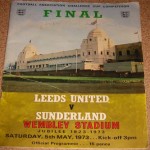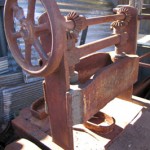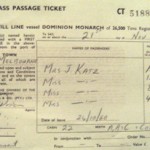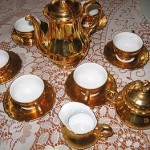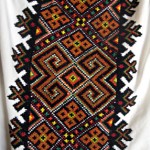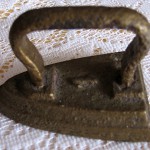Italian
San Ferdinando, Reggio, Calabria, Italy
Naples, Italy on 24 December 1948
Sydney on 3 February 1949
Farm 1730, Toorak Road, Leeton, Riverina, New South Wales
Family roadside fruit & vegetable stall
Farming and Letona Cannery worker
I was born in San Ferdinando, Reggio, Calabria, Italy. I came out on the ship Napoli when I was ten and a half years old with my mother, Isabella. Mum tried to pack all she could and one of the things was a canvas mattress cover and wool. We stuffed the cover when we got here so we would have a bed to sleep on. I always found it funny that we bought wool to Australia where so much wool was produced. We left from Naples and it took 44 days to get to Sydney, Australia. The food on the ship was very good. A lot of people were sick but I was ok.
The ship was terrible; it was an old army cargo ship, which had some bunks put on it. There were a few cabins but mostly it was just bunks in an open dormitory style with women on one floor and men on another. This was the Napoli‘s second voyage as a passenger ship and it didn’t have any ballasts so when you went in to eat and the sea was rough, all the plates would fall on the ground. The ship was carrying some cargo, marble and onions, and I remember the onions got wet and they started to smell and everyone on board was getting sick, the smell was terrible.
We came to meet up with my father Antonio who had been in Australia since 1939; he was at the port to meet us. I was only eight months old when he left, so it was wonderful and strange to see him. Dad was called out [to Australia] by his father-in-law, Michele De Luca, because of potential of war in Italy and his own father thought it would be safer here in Australia. Dad wrote to us when he could. He was only here two months when the war broke out and was taken to an internment camp in Sydney. He went right around Australia from Sydney to Hay, Cowra, Port Augusta and Alice Springs and ended up in Darwin. In Darwin, Dad was allowed to work on the railway. He was paid a shilling a day. He did tell us a little about his time in Alice Springs, where there were 1,800 Italians; farmers, doctors etc. When he was released he tried to start farming in Sydney but came back to Leeton where his father-in-law was and started farming again.
On my first day in Australia we spent the day at Rachella and Ferdinando Bianchini’s house in Rose Bay, we had our first family photo taken in their backyard. Then we went to sleep at Rachella’s parents, the Lavelle family, who were friends of Dad’s and we stayed two days in Woolloomooloo. Sydney looked good to me, but coming to another country, everything looked nice and it looked good compared to Italy at that time.
We came to Leeton on the night train and arrived in the morning. Dad took us to a house that he rented on Farm 1730 Toorak Road, Leeton. I thought it looked better here [too] than where I was from in Italy because we had just come out of the war. During the war I remember that I had to run away from bombs and here in Leeton everything was quieter and I felt safer.
My grandfather Michele De Luca was one of the first Italians from Calabria to come to Leeton in 1922. He had heard that there was work in ‘America’. In San Ferdinando they would think ‘America’ but could end up in Australia, America or Argentina! He then called others from San Ferdinando to come here also. My grandfather was still alive when I arrived. His English was about 40 per cent but the people in Leeton seemed to understand him. He died at 81 years of age in 1964.
Dad rented land from Mr Alf Yeo on the Griffith Road where he was growing vegetables and fruit: tomatoes, watermelons and onions, a little bit of everything. Dad built a little stall beside the road where we were able to sell all things that he grew. I remember on the first day I made 17 shillings and sixpence ($1.75 in today’s money). That was a good day’s work. I still have a photo of me [in] front of stall.
The Australian people were so good to me, they were patient, and tried [to] teach me a few words. I communicated with my hands until I learnt a little English. The older Australians would teach me Australian slang words like ‘threepence-a tray’, ‘shilling-dena’, ‘potato-murphy’. Mum worked at the stall if I was not there, and although she could not speak English, she was still able sell the fruit and vegetables.
One Sunday, a man stopped at our stall to buy rockmelons. He was delivering the Sydney newspapers and asked if I wanted a newspaper to look at. Every Sunday he would throw me a newspaper as he went by whether he bought something or not. Today I still have trouble writing but I can read. I think that was because I was interested in the stories in the newspapers and learnt that way.
About ten years later Dad built a house on Mr Yeo’s land. Then, when we were able to make some money, we bought our own farm in 1959 in Corbie Hill, which was about seven kilometres from Leeton.
I did go to Leeton Primary School and then to Leeton High School a little but it was difficult for me. Some kids teased me every afternoon because I was a big boy and I was different. They would call me names. I was one of the first Italian kids to come here after the war. There were other Italian kids but they were here already before the war or were born here. I would get into trouble for not doing the work on the blackboard but one day a lady teacher tried to ask why I wasn’t doing the work. I just shrugged my shoulders, so she got one of the Italian boys to ask me and then she understood that I had no idea of what she wanted me to do and apologised to me. It took me 12 months to say a word in English. I would listen, but in case I said a word wrong, I didn’t speak it. But some of those kids I used to fight are my best friends today.
Mum and Dad didn’t really know what was going on at school. Dad wanted me to go to school but he needed my help as well, so if I could help him on the farm I was happy. One time the authorities came home and told us that they would take me away to Sydney because I wasn’t attending school. Dad got so angry and told them to get off his property and threatened them with a shotgun. He knew I should get an education but he needed help as well. We were both torn about what to do and I loved working with him.
I was a big, young fella and when I was 17 years old I went to work local[ly] at the Letona Cannery during the canning season and by then I could speak English and there were a lot of Italians working there as well. When I first started, one of the chaps who did the hiring asked me how old I was. I told him I was 21 and I was paid as a 21 year old which meant more money. My first position was in the tin shop getting the cans ready for the fruit. Eventually I worked all over the cannery. I continued to work on the farm with Dad and Mum. We all settle[d] well even Mum. We enjoyed working together, helping each other.
Unfortunately Mum and Dad did not have any other children; Mum was sick a lot and never ended up having any more. When she would go to the doctors she would go with one of the other Italian ladies who would translate for her. Later when my English improved I would take her to all her appointments. I didn’t always know what she was telling me specifically but the doctor seemed to know. He would tell me what he wanted Mum to do or take.
Mum packed all the baby clothes that she had made for me hoping that she would have other children when she reunited with Dad but it was not to be. She kept them all these years and I could not get rid of them because they were so special to her. Mum would have made them in 1938 before I was born. I always found it funny that there were pink outfits that I would have worn when I was a baby, but I guess she did all colours in case I was a girl. These outfits gave her and me sad, but beautiful, memories.
In 1968, Mum went to visit Italy, which she always called home. She contacted Dad and said she wanted to come home. Dad said to her, “What are you talking about, you are already home.” Mum said, “No, home is Australia now.” Dad was amazed at that.
In the early days no-one would work on Saturday afternoons and the Italians would meet at the park in town or go to the pictures at night. We loved the Cowboy and Indian movies, and we would go altogether. Then on Sunday we would visit other families or they would come to our place. We didn’t mix a lot with the “Australian” families because of the language barrier, but we did try. The language and the culture were different. The Italian community would help each other if something went wrong; it was nice to know they were there.
I married Eleanora Fondacaro in July 1970 here in Leeton. I didn’t really have a desire to go back to Italy but Eleanora did and we went back in 1993. I am glad I went to see the old places. My wife was only five when she came to Australia in 1955 and she didn’t think I would remember where places like our house or the family farm were, but I did. It was easy. Things had gotten better in San Ferdinando but I was happy to be in Australia. I consider myself now as an Italian-born Australian. Eleanora and I still live in Leeton and have three girls and a boy and two grandchildren.


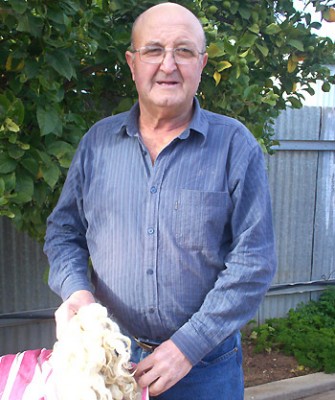


![Antonio Punturiero, aged 12, working at fruit and vegetable stall, Leeton, 1950 "Dad built a little stall beside the road where we were able to sell all things that he grew. I remember on the first day I made 17 shillings and sixpence ($1.75 in today's money). That was a good day's work. The Australian people were so good to me, they were patient, and tried [to] teach me a few words. I communicated with my hands until I learnt a little English. "](../../../cms/wp-content/uploads/2008/10/image3.jpg)


!["We stuffed the cover [with wool] so we would have a bed to sleep on. I always found it funny that we bought wool to Australia where so much wool was produced."](../../../cms/wp-content/uploads/2008/10/wool-150x150.jpg)
!["Mum would have made them in 1938 before I was born. I always found it funny that there were pink outfits that I would have worn, but I guess she did all colours in case I was a girl. She hop[ed] she would have other children but it was not to be. These outfits gave her and me sad, but beautiful, memories."](../../../cms/wp-content/uploads/2008/10/baby2-150x150.jpg)
